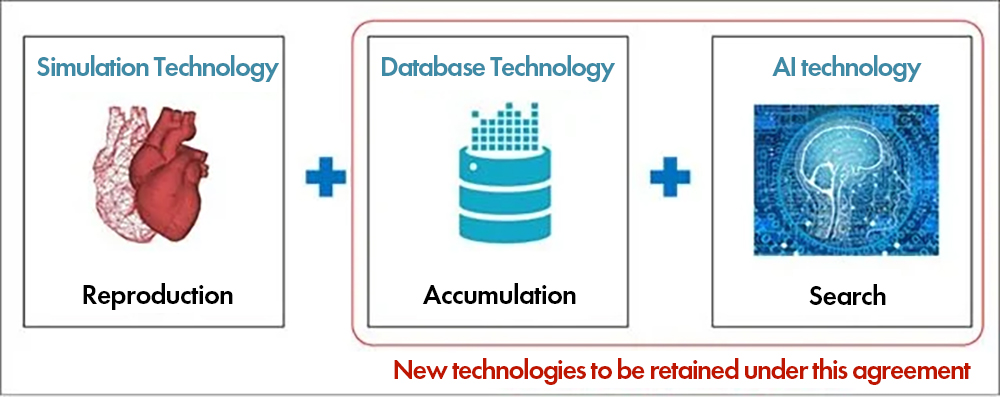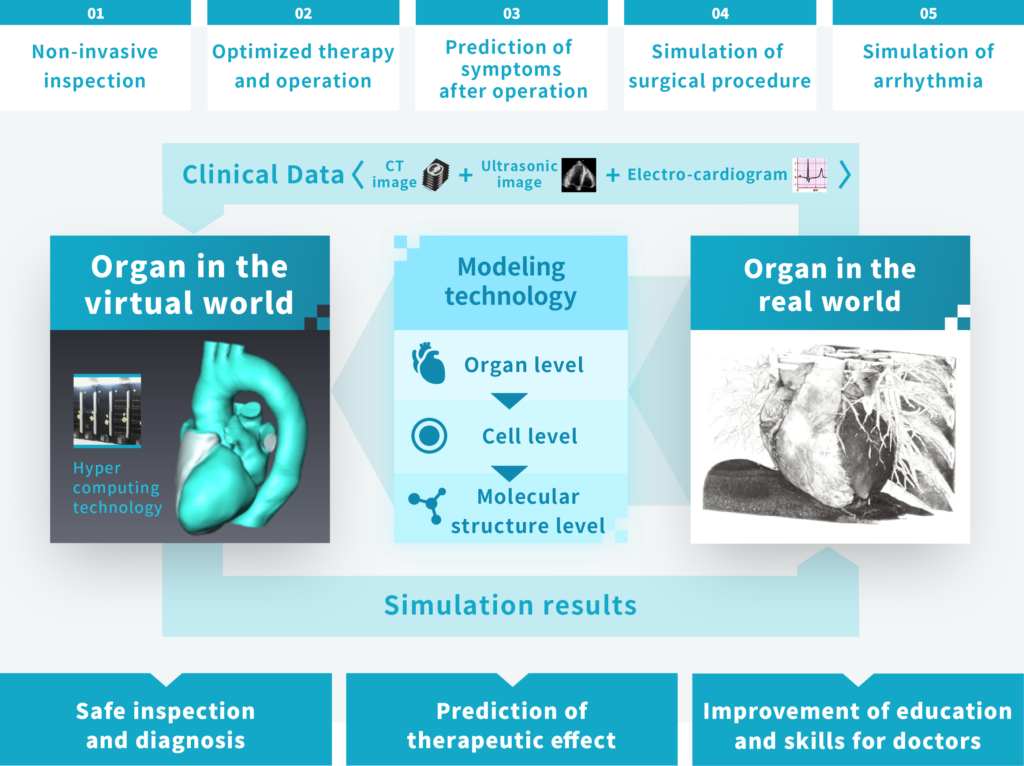The world's first health screening service that combines supercomputer heart simulation and AIJapan Medical Device Corporation (Headquarters: Kawasaki City, Kanagawa Prefecture, Representative Directors: OKANO Takafumi, CHIBA Shuichi, hereinafter referred to as “JMD”) has signed a joint research agreement with UT-Heart Inc. (Headquarters: Setagaya-ku, Tokyo, Representative Director: Toshiaki Hisada, hereinafter referred to as “UTH Labs”). In this research, we will make full use of the computing power of Japan’s world-class supercomputer “Fugaku” and develop a new AI model for early detection of various heart diseases based on electrocardiogram data from health screening.
Heart disease is an increasingly important concern for maintaining health. The number of patients with heart failure is estimated to reach about 1.2 million nationwide and reach 1.3 million by 2030. *1
According to a survey by the WHO World Health Organization, ischemic heart disease was the leading cause of death in 2019. ※2
Despite the fact that heart disease significantly damages QOL at the time of incidence, it can be said that it is difficult to realize the risk. In particular, early detection is important because heart failure progresses gradually and becomes more difficult to deal with as it progresses, but it is difficult to connect to a doctor’s diagnosis until the subjective symptoms progress quickly.
On the other hand, it is reported that more than 64.3% of people aged 20 years or older have undergone health screening or complete medical checkups. *3
Therefore, applying a wide net in health screening is a powerful way to reduce the number of affected patients.
Currently, the main medical examination is a hassle-free electrocardiogram. The purpose of this research and development is to realize precision medicine for early detection of heart failure by combining heart simulation technology and AI from this electrocardiogram data alone.
■Details of development
JMD, together with UTH Labs, will develop AI technology to extract a virtual heart that draws an electrocardiogram closest to the electrocardiogram of each person examined from a vast “virtual” heart disease database built using the supercomputer “Fugaku” based on heart simulation technology.
In general, the characteristic changes seen in ECG waveforms are formed by a combination of a number of physiological parameters at each level of the heart, from micro (molecular) to macro (organ and human body).
Since these parameters are known for each heart in the “virtual” heart disease database, extracting a virtual heart with ECG characteristics can estimate the state of the parameters for each person that cannot be seen by conventional tests.
On the other hand, what parameter states appear in the early stages of heart failure is being identified by joint research between the University of Tokyo Hospital and UTH Labs.
By comparing the status of both parameters, it is expected that it will be possible to accurately diagnose and detect the risk of heart failure in individuals. The heart disease database already contains about 30,000 virtual heart patterns, which will be doubled to cover a wider range of variations in the future.
Currently, AI research is actively conducted by learning real clinical data, but as is well known, it is difficult to explain why such conclusions were obtained with AI, and even if it is possible to explain, it is only a superficial and statistical explanation on the treated data.
In response to this, we aim to be the world’s first health screening service that can detect abnormalities in the causative factor of heart failure at an early stage by estimating the distribution of various parameters behind it for each individual and performing a precise diagnosis, even though only simple electrocardiogram data is used.

■Market size
Currently, about 60% of people in Japan undergo health screening and complete medical checkups and the market size is estimated to be about 900 billion yen.
There are many optional examinations for health screening and complete medical checkups. For example, about 40% of people receive CEA screening (tumor markers), and the cost is from several thousand yen ~ 10,000 yen per visit. ※4
Heart disease is one of the three major adult diseases and is of interest to a wide range of people. This service can be diagnosed only with the examination data of regular health screening and complete medical checkups. It is not invasive, so it does not place a burden on the patient. Nevertheless, it provides detailed information about heart disease risk. Therefore, a higher consultation rate is expected.
In Japan, where the population is super-aging, which increases the risk of heart disease, the need for early detection of heart disease is expected to increase more and more in the future.
■Schedule and Steps
The trial operation is scheduled to start in April 2024, and after one year of verification, the full-scale deployment of the service is scheduled for April 2025.
■Social contribution using the results of “Fugaku”
As a result of the Ministry of Education, Culture, Sports, Science and Technology’s “Program for Accelerating the Achievement of the Supercomputer Fugaku” (Project No. hp220178), the “virtual” heart disease database has already been released by UTH Labs free of charge (*5). In addition, as part of this (JPMXP1020230120, Project No. hp230216), JMD will launch a data access API (Application Programming Interface) and comprehensively operate it as a free data service.
By providing such a platform, we will support various types of heart disease research at universities and hospitals, etc., and contribute to the realization of a society of health and longevity in Japan.
■Intellectual Property Rights
Regarding the “virtual” heart disease database, UTH Labs has filed an international PCT application (PCT/JP2022/032302) and registered Japan (Patent No. 7266349).
We own the rights to use it from UTH Labs.

■Details of the joint research agreement
Research Topics
Practical research on heart simulation using HPC (High Performance Computing) by “Fugaku” and others, and commercialization of research results
Research Objectives
Contribute to the development of medical care through heart simulation using HPC and enhance the social presence of companies by disseminating cutting-edge technologies Research content
Develop and commercialize the following three technologies using heart simulators: Individual heart failure risk prediction using in silico heart disease database
Cardiotoxicity Evaluation System
Integration with molecular simulation
Research Assignment
UTH Labs.: Research and development of heart simulator and in silico heart disease database
JMD: Technical cooperation, database operation, and commercialization with UTH Labs mainly in AI and HPC-related fields
Research Term October 1, 2022 – March 31, 2026
■About Japan Medical Device Corporation (JMD)
JMD is a company that researches, develops, and provides computer simulation services as a new medical device utilizing the heart simulator (UT-Heart) which was created by the University of Tokyo over a period of more than 20 years.
UT-Heart is the world’s highest technology that can faithfully reproduce the movement of an individual’s heart in detail based on electrical and mechanical behavior at the molecular level by utilizing the computing power of a supercomputer using clinical data such as CT and ultrasound images as input.
Precise medical simulations require cutting-edge skills and know-how to express medical knowledge in an engineering manner and bring out the latest computer capabilities.
In addition to having top-class computer science engineers, JMD also has AI development engineers, and is developing in collaboration with Japan’s top research and demonstration institutions to build and provide services including medical data processing for simulation model creation and visualization of simulation results (pre and post processing).
In order to realize precision medicine, JMD will save many lives and contribute to improving the QOL (quality of life) of all humankind by providing health screening services for the early detection of heart disease, the world’s most common cause of death, and computer simulation services that provide advanced diagnosis and treatment support.
Home Page https://jmd-corp.com/en
■About UT-Heart Inc. (UTH Labs)
UTH Labs was established in October 2013 as a venture project originating from the University of Tokyo to further deepen and utilize the research results of UT-Heart, a heart simulator that has been intensively developed at the Graduate School of Frontier Sciences, the University of Tokyo since 2002. It is an internationally outstanding private research institute that conducts a wide range of research from basic research in medicine and computational science to clinical research, simulation research in drug discovery and the development of various medical devices.
Home Page http://ut-heart.com/jp/index.html
■Note
*1 Japan Heart Foundation Heart failure in the elderly https://www.jhf.or.jp/check/heart_failure/01/
*2 WHO announces “Top 10 Causes of Death in the World” Heart disease ranks first, Diabetes and dementia also rank high, Prevention and reform through diet and exercise https://tokuteikenshin-hokensidou.jp/news/2021/009672.php
*3 Overview of the Ministry of Health, Labour and Welfare’s 22nd National Living Basic Survey > 5 Status of health screening (health screening and complete medical examinations) https://www.mhlw.go.jp/toukei/saikin/hw/k-tyosa/k-tyosa10/3-5.html
*4 Yano Research Institute Ltd. Conducted a survey on the health screening and complete medical checkup market (2021) https://www.yano.co.jp/press-release/show/press_id/2824
*5 Database labeled with subcellular pathologies developed by multi-scale heart simulator, UT-Heart http://ut-heart.com/ECGdata_fugaku/database_download.html
■Company Profile
Name: Japan Medical Device Corporation
Established: November 16, 2020 (Reiwa 2)
Location: Kawasaki Nisshincho Building, 7-1 Nisshincho, Kawasaki-ku, Kawasaki-shi, Kanagawa 210-0024, Japan
Representative: OKANO Takafumi (CEO), CHIBA Shuichi (CTO)
Description of Business: Research and development of new medical device computer simulation service using the heart simulator (UT-Heart)
Home: https://jmd-corp.com/en
